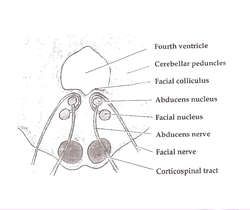Lateral pontine syndrome

Editor-In-Chief: Prab R Tumpati, MD
Obesity, Sleep & Internal medicine
Founder, WikiMD Wellnesspedia &
W8MD's medical weight loss NYC, sleep center NYC
Philadelphia medical weight loss and Philadelphia sleep clinics
| Lateral pontine syndrome | |
|---|---|

| |
| Synonyms | Marie-Foix syndrome |
| Pronounce | N/A |
| Specialty | Neurology |
| Symptoms | Ataxia, hearing loss, facial paralysis, vertigo, nystagmus, Horner's syndrome |
| Complications | N/A |
| Onset | N/A |
| Duration | N/A |
| Types | N/A |
| Causes | Ischemic stroke in the lateral pons |
| Risks | Hypertension, diabetes mellitus, hyperlipidemia, smoking |
| Diagnosis | MRI, CT scan |
| Differential diagnosis | Medial pontine syndrome, lateral medullary syndrome |
| Prevention | N/A |
| Treatment | Thrombolysis, antiplatelet therapy, rehabilitation |
| Medication | N/A |
| Prognosis | Variable, depends on extent of damage and treatment |
| Frequency | Rare |
| Deaths | N/A |
Lateral pontine syndrome (also known as Marie-Foix syndrome or ventral pontine syndrome) is a type of stroke that affects the pons, a part of the brainstem. This condition is characterized by a variety of neurological symptoms, including facial paralysis, dysphagia (difficulty swallowing), and ataxia (lack of muscle control or coordination).
Etiology[edit]
Lateral pontine syndrome is typically caused by a brain infarction in the distribution of the anterior inferior cerebellar artery (AICA). This can occur due to a variety of conditions, such as atherosclerosis, embolism, or vasculitis.
Symptoms[edit]
The symptoms of lateral pontine syndrome can vary depending on the exact location and extent of the infarction. Common symptoms include:
- Facial paralysis: This is often one of the first symptoms to appear. It is caused by damage to the facial nerve, which controls the muscles of the face.
- Dysphagia: Difficulty swallowing can occur due to damage to the nucleus ambiguus, which controls the muscles involved in swallowing.
- Ataxia: Lack of muscle control or coordination can occur due to damage to the cerebellum or its connections.
Diagnosis[edit]
Diagnosis of lateral pontine syndrome is typically based on the patient's symptoms and medical history, along with neuroimaging studies such as MRI or CT scan to confirm the presence of a brain infarction in the pons.
Treatment[edit]
Treatment for lateral pontine syndrome is primarily supportive and aims to manage the patient's symptoms. This may include physical therapy for ataxia, speech therapy for dysphagia, and medications to manage any associated pain or discomfort.
Prognosis[edit]
The prognosis for lateral pontine syndrome can vary widely depending on the extent of the infarction and the patient's overall health. Some patients may experience a significant recovery with treatment, while others may have persistent or progressive symptoms.
See also[edit]
Ad. Transform your life with W8MD's Budget GLP-1 injections from $75


W8MD offers a medical weight loss program to lose weight in Philadelphia. Our physician-supervised medical weight loss provides:
- Weight loss injections in NYC (generic and brand names):
- Zepbound / Mounjaro, Wegovy / Ozempic, Saxenda
- Most insurances accepted or discounted self-pay rates. We will obtain insurance prior authorizations if needed.
- Generic GLP1 weight loss injections from $75 for the starting dose.
- Also offer prescription weight loss medications including Phentermine, Qsymia, Diethylpropion, Contrave etc.
NYC weight loss doctor appointmentsNYC weight loss doctor appointments
Start your NYC weight loss journey today at our NYC medical weight loss and Philadelphia medical weight loss clinics.
- Call 718-946-5500 to lose weight in NYC or for medical weight loss in Philadelphia 215-676-2334.
- Tags:NYC medical weight loss, Philadelphia lose weight Zepbound NYC, Budget GLP1 weight loss injections, Wegovy Philadelphia, Wegovy NYC, Philadelphia medical weight loss, Brookly weight loss and Wegovy NYC
|
WikiMD's Wellness Encyclopedia |
| Let Food Be Thy Medicine Medicine Thy Food - Hippocrates |
Medical Disclaimer: WikiMD is not a substitute for professional medical advice. The information on WikiMD is provided as an information resource only, may be incorrect, outdated or misleading, and is not to be used or relied on for any diagnostic or treatment purposes. Please consult your health care provider before making any healthcare decisions or for guidance about a specific medical condition. WikiMD expressly disclaims responsibility, and shall have no liability, for any damages, loss, injury, or liability whatsoever suffered as a result of your reliance on the information contained in this site. By visiting this site you agree to the foregoing terms and conditions, which may from time to time be changed or supplemented by WikiMD. If you do not agree to the foregoing terms and conditions, you should not enter or use this site. See full disclaimer.
Credits:Most images are courtesy of Wikimedia commons, and templates, categories Wikipedia, licensed under CC BY SA or similar.
Translate this page: - East Asian
中文,
日本,
한국어,
South Asian
हिन्दी,
தமிழ்,
తెలుగు,
Urdu,
ಕನ್ನಡ,
Southeast Asian
Indonesian,
Vietnamese,
Thai,
မြန်မာဘာသာ,
বাংলা
European
español,
Deutsch,
français,
Greek,
português do Brasil,
polski,
română,
русский,
Nederlands,
norsk,
svenska,
suomi,
Italian
Middle Eastern & African
عربى,
Turkish,
Persian,
Hebrew,
Afrikaans,
isiZulu,
Kiswahili,
Other
Bulgarian,
Hungarian,
Czech,
Swedish,
മലയാളം,
मराठी,
ਪੰਜਾਬੀ,
ગુજરાતી,
Portuguese,
Ukrainian
